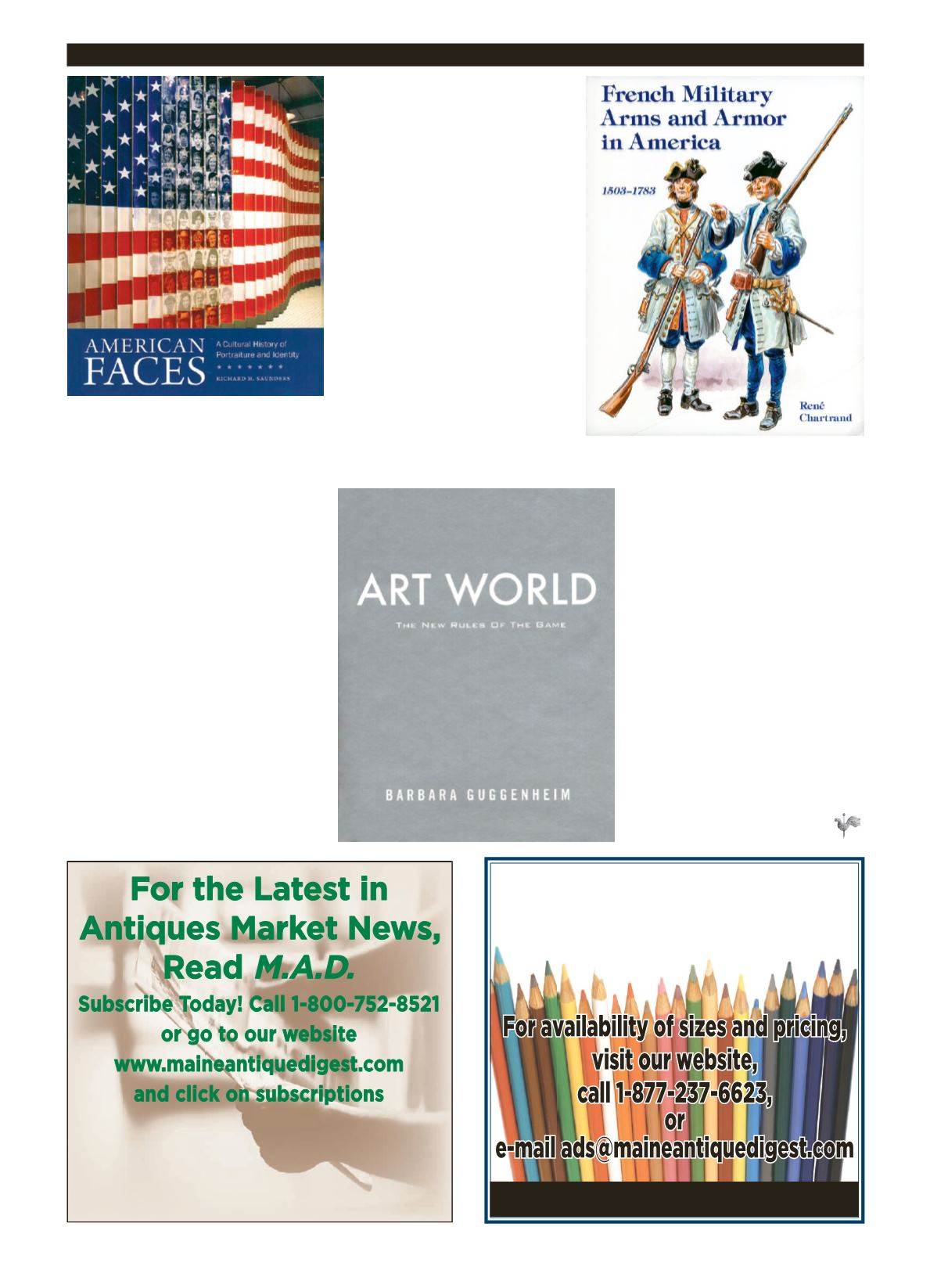

40-C Maine Antique Digest, December 2016
-
FEATURE -
French Military Arms and Armor in America:
1503-1783
by René Chartrand (Mowbray Pub-
lishing, 2016, 216 pp., softbound, $35.99 plus S/H
from Mowbray Publishing, [www.gunandsword collector.com] or 1-800-999-4697).French arms and armor used in French Amer-
ican territories from the early 1500s, the days of
explorers and settlements, up through the Ameri-
can Revolution are covered in this book. The author
uses many source documents, illustrations, and art-
works to explore the variety of military weapons
and accouterments that were used; there is some
overlap between time periods. Each chapter delves
into the historical context and then looks at specific
types. Technical details are omitted, and no values
are given. As the author states in the introduction,
this book is not “intended as a study giving detailed
mechanical descriptions, but rather…a broad and
comprehensive survey.”
An appendix lists the main features of the metro-
politan army infantry muskets from 1717 to 1777.
There are labeled illustrations that identify the
pieces of a suit of armor and the parts of a rapier
guard, a matchlock, a flintlock musket, a flintlock,
a snaphance lock, and a wheel-lock. Also by way
of introduction the book includes an overview of
the history of French administrative territories with
maps and an explanation of French measurements.
Appendices, a chronology, a glossary, a bibliogra-
phy, endnotes, and an index are also included. His-
torians and collectors will appreciate this in-depth
look at French arms from a historical perspective.
American Faces: A Cultural History of Portraiture and
Identity
by Richard H. Saunders (University Press
of New England, 2016, 260 pp., hardbound, $45 plus
S/H from University Press of New England, [www. upne.com] or 1-800-421-1561).“A picture paints a thousand words” is a familiar
idiom, but what does a portrait say? This book explores
the American love affair with portraits, “a lengthy, com-
plicated, and often intense relationship with images of
ourselves,” writes Richard H. Saunders in the introduc-
tion. Rather than a survey of portraits, this book is a the-
matic exploration of the topic. Saunders is the director
of the Middlebury College Museum of Art and a pro-
fessor of art and architecture. He focuses primarily on
United States portraiture, from formal painted portraits
to the fairly new and ubiquitous selfie, and explains that
expanding the discussion beyond U.S. pictures is beyond
the scope of this work. He acknowledges that portraits
“carry tremendous symbolism” worldwide.
Saunders begins by exploring the meaning of portraits
of the rich, or what he calls “society” portraits. He then
moves on to discussing portraits for everyone, which
includes small silhouettes and other renderings and the
beginnings of photography, and then portraits of famous
people, in which he discusses the godlike status that
George Washington’s portraits have given him. Other top-
ics include propaganda and “Self andAudience,” in which,
among other issues, the portrait in social networking is
discussed briefly. “Rituals, Power, and Memory” and the
gallery format are explored in the last two chapters.
The illustrations show many types of portraits, includ-
ing paintings, silhouettes, sculptures, photographs, and
much more. This book certainly will cause readers to
have a better understanding of portraits and to rethink
what a picture says, particularly how portraits define and
celebrate “our own place in society.”
Art World: The New Rules of the Game
by
Barbara Guggenheim (Marmont Lane Books,
2016, 409 pp., hardbound $29.95).
This easy-to-read (in style, font, and layout),
entertaining, and informative book will help you, or
an art lover you know, navigate the “wild, wonder-
ful art world.” In a witty and conversational style,
Guggenheim offers advice and stories about art,
artists, and buying art. She is an experienced voice
as an art advisor. For starters, she introduces and
analyzes the roles of the players in what she calls
the “game,” including the artists, dealers, auction
houses, art advisors, art fairs, museums, and writers
(art critics, art journalists, and art historians). She
moves on to discuss collections and collectors; the
importance of due diligence and all the steps neces-
sary to accomplish it; and the care of an art invest-
ment in “After You Own It.” She closes with a dis-
cussion on selling, trading, or giving away artwork.
Color illustrations of the artworks mentioned are in
the back, along with a glossary and a bibliography.
Would you like to
see your ad in color?
www.maineantiquedigest.comMaine Antique Digest
PO Box 1429, Waldoboro, ME 04572-1429
Toll-free 1-800-752-8521
Fax (207) 832-7341











